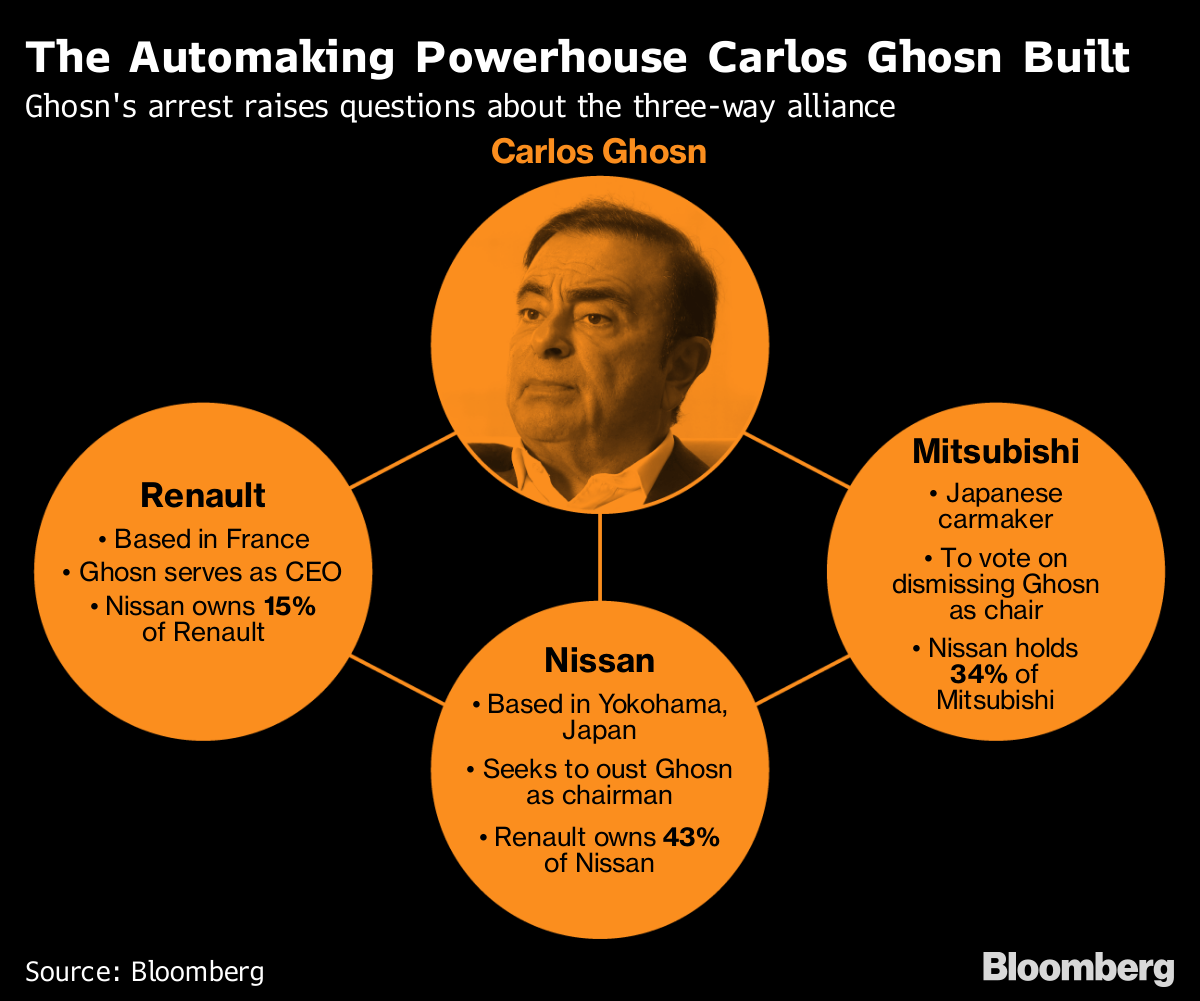Nov 22, 2018
Nissan ousts Ghosn as chairman, escalating fallout from arrest
, Bloomberg News
Nissan Motor Co.’s board removed Carlos Ghosn as chairman, moving to contain the damage from the iconic executive’s shock arrest and paving the way for his top lieutenant to consolidate power over the Japanese carmaker.
The decision to remove Ghosn and director Greg Kelly from their positions was unanimous, Nissan said in a statement after its board met Thursday. Nissan confirmed that its alliance with largest shareholder Renault SA remained unchanged. The Japanese carmaker hasn’t decided on an interim chairman, a spokesman said.
Ghosn, who has been detained by Japanese authorities since Monday, is set to officially remain a director, since a shareholder vote is needed to remove him from the board completely.
“It’s a coup,” said Tatsuo Yoshida, an analyst at Sawakami Asset Management, who used to work at Nissan. “Ghosn’s era is over.”
The removal follows probes by Nissan and Japanese authorities into alleged financial misconduct by long-time leader Ghosn, with Chief Executive Officer Hiroto Saikawa emerging as a driving force behind the investigation. Prior to his surprise arrest in Tokyo on Monday, Ghosn had been preparing to push for a full merger of Nissan with French partner Renault, which he also heads as CEO and chairman. That combination plan has faced resistance from Saikawa, who Ghosn in the past presented as his protege.
Without Ghosn at the head of Nissan’s board, a merger looks very unlikely. The charismatic French-Brazilian executive was architect and linchpin of the two-decade-old alliance, created as an attempt to add heft against global rivals. Ghosn’s arrest has now laid bare resentments that have built as the Japanese and French sides alternated successes and struggles over the years.
Lately, the structure has become increasingly controversial in Japan due to Nissan’s strong financial performance. Although it’s generally outgrown Renault in sales and profits, the Japanese company has far less influence within the alliance. It owns a 15 percent non-voting stake in Renault, which in turn owns 43 per cent of Nissan, with voting rights. Mitsubishi Motors Corp. was added to the alliance in 2016.
Nissan has long been unhappy about what it considers an outsize French role, and Saikawa made reference to that perceived imbalance at the late-night press conference he called on Monday to respond to Ghosn’s arrest.
The French side, conversely, has been keen to maintain -- if not intensify -- the current relationship. French Finance Minister Bruno Le Maire said Wednesday that the partnership is set to continue and will be deepened. As Renault’s largest shareholder, the French state is “totally attached to the alliance of Renault and Nissan,” he said.
The unanimous vote by Nissan directors to oust Ghosn means the Renault representatives on the board also backed his removal. The French carmaker itself put in place new interim leadership earlier this week but declined to fire Ghosn, saying he should be presumed innocent until more details become available. Interim Renault CEO Thierry Bollore said “the alliance is vitally important for Renault and we will ensure total continuity with our partners.”
Renault board indicated that it was in the dark about the details of the allegations. “At this stage, the board is unable to comment on the evidence seemingly gathered against Mr. Ghosn by Nissan and the Japanese judicial authorities,” it said in a statement earlier this week.

The Accusations
Ghosn, who was among the best-paid executives in both France and Japan, stands accused of under-reporting income of about US$44 million and misusing company funds at Nissan. He is suspected of breaking the Financial Instruments and Exchange Law, and the alleged offense may carry a sentence of up to 10 years, Shin Kukimoto, deputy chief prosecutor at the Tokyo District Public Prosecutors Office, told reporters Thursday. The alleged offense, he declared, is even more serious than insider trading.
Ghosn hasn’t commented on the allegations or been seen in public since his arrest. He has picked Motonari Otsuru, a former head of a special investigation task force of the Tokyo public prosecutor’s office, as his lawyer, NHK said.




